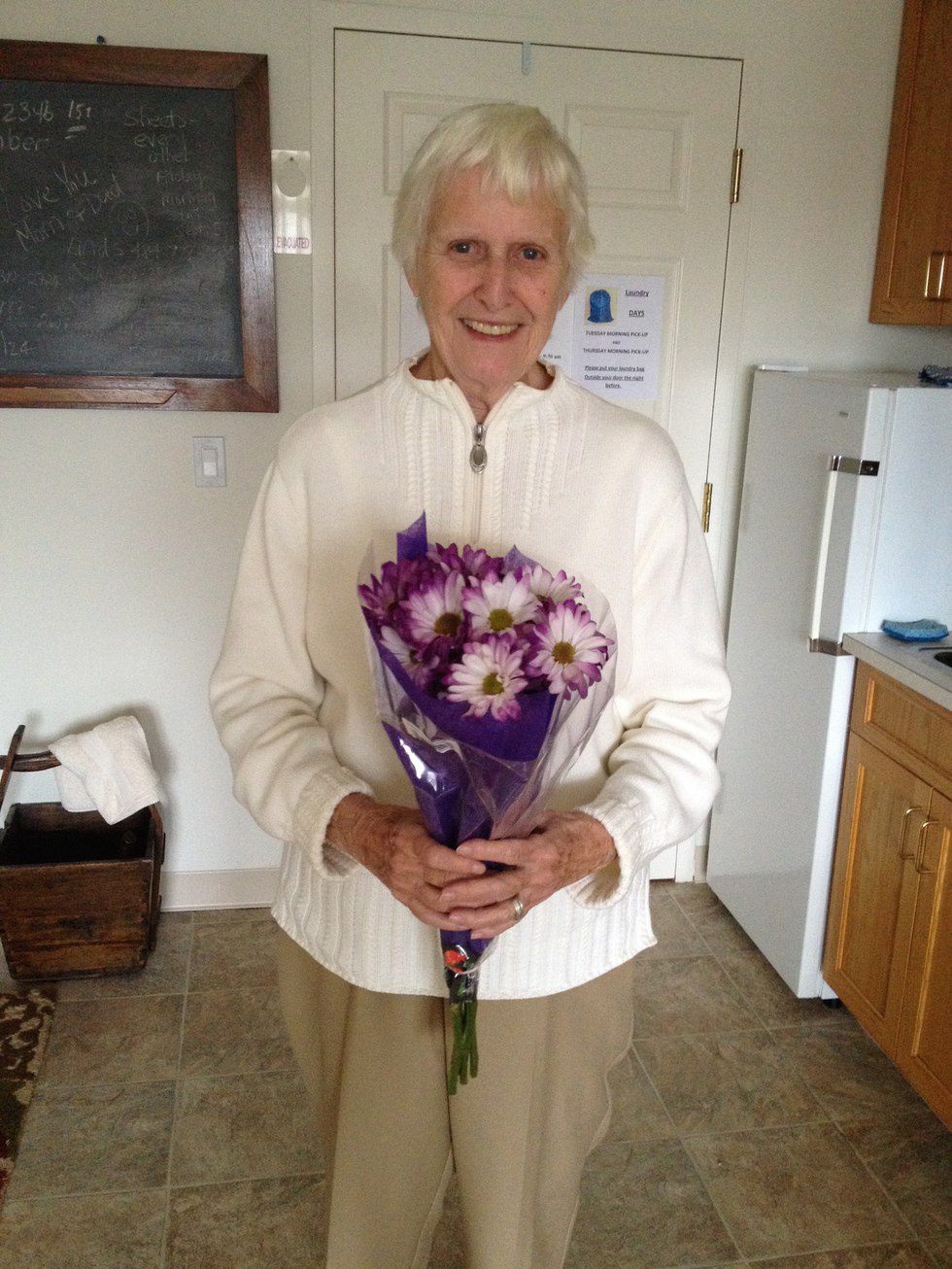Unlike other diseases, Alzheimer’s disease (AD) changes the personality of the person afflicted, which makes it a particularly difficult diagnosis to come to terms with. It’s hard to accept that the person you know love and know so well will eventually be someone different entirely, and I think this is why a lot of people tend to shy away from the disease instead of facing it head on. It’s okay, and completely natural, to grieve for a period of time after learning your loved one has AD, but it’s important that you don’t go into denial and try to convince yourself that your loved one will not change that much.
Although AD moves slowly in its beginning stages, and has mild symptoms (forgetting names, misplacing objects) at first, you’ll want to prepare yourself for the more serious stages to come. Taking a practical approach is key—realize that AD affects everyone differently, and take the time to really understand how it affects your loved one. My grandmother began showing signs of dementia more than five years ago, and I have been fortunate enough to be able to spend a lot of time with her because my grandparents live nearby. As her disease has progressed, I have had many opportunities to learn what works, and what doesn't work, in the ways I interact with her. I’m obviously not an expert, but I think what I’ve learned from my grandmother can benefit anyone who deals with AD firsthand.
Pay attention to what your loved one responds to
Don't assume that a person with AD will react to something the same way you do. It’s easy to think that you’ll be able to watch a movie together or at least an episode of television, in order to occupy your loved one’s attention for a period of time without having to do much. But the truth is that AD affects the five senses, sometimes quite severely, so watching a movie or even showing your loved one photographs is not always the best activity to do together. Even if an AD patient has perfect vision, he or she may be unable to process visual cues. I know that my grandmother sometimes will look in the direction of the TV, but the blank look on her face tells me she isn’t really getting anything from it. The same goes for smell, taste, hearing, and touch—the brain starts losing the capacity to compute what the person’s body is experiencing.
Plan activities
Once you know what your loved one does and does not respond to, go from there. Despite the fact that AD impacts the sensory system, playing familiar music for patients often invokes a positive response. Scientists have been conducting research on this phenomenon for years now; in an article for LiveScience published in 2012, Natalie Wolchover wrote:
[W]hen people learn music, we store the knowledge as "procedural memory," the kind associated with routines and repetitive activities (also known as muscle memory). Dementia primarily destroys the parts of the brain responsible for episodic memory — thetype that corresponds to specific events in our lives — but leaves those associated with procedural memory largely intact. Because we don't shed this memory as we grow old, we retain our appreciation for music.
I personally can attest to this fact; when we put on old songs for my grandmother, she can sing along to the majority of them. Just this past summer, I played a Simon & Garfunkel album for her, and she knew the words better than I did. But listening to music isn’t the only thing you can do with AD patients; other activities include getting them out into the fresh air and sunlight, or bringing a pet to visit them (or even bringing them to the pet store, if possible). Depending on the severity of your loved one’s condition, he or she might enjoy participating in easy puzzles and games, or doing simple household chores that create a sense of accomplishment. The point is to keep your loved one feeling involved with, rather than excluded from, daily life.
Think about the questions you ask
Put some thought into your questions instead of simply blurting them out. If you ask something like, “What did you have for breakfast today?” or “Do you remember when _____?”, not being able to answer might make your loved one feel frustrated, embarrassed, or ashamed. It’s better to ask questions like, “How are you feeling today?”, “Do you like that sandwich?”, or “Can you tell me a little bit about what you did today?” (For that last one, it’s better to first ask your loved one if he or she can tell you something instead of just asking something flat out, because that way, he or she has the option of saying “no” instead of feeling pressured to answer). Yes or no questions are best when figuring out something specific (e.g. “Would you like some pancakes?” is better than “What do you want for breakfast?”). However, don’t feel like you should ask only close-ended questions, as questions that can be answered with yes or no will not help to open up conversation or lead to real communication.
It can be tempting to ask an AD patient if he or she remembers X, Y, or Z, but again, not being able to remember something could make him or her feel stupid. Instead, you could say something like, “I remember when you and dad took that trip to Italy. You told me about the day you ate gelato and watched the street performers.” Mentioning specific things like this could jog an AD patient’s memory, and if your loved one knows what you are talking about, he or she will probably chime in. If not, there’s no pressure for an answer. Basically, the bottom line is to just be mindful of what you’re asking and how you phrase it.
Figure out the best way to communicate
As might be expected, it can be very difficult to communicate with an AD patient. In the beginning, you might have to help fill in words or remind a patient of people’s names, but in the middle to severe stages of the disease, a patient will have a hard time articulating the simplest of things. In my experience, this leads to a good amount of guesswork. For example, my mom visits her parents and has breakfast with them everyday. Instead of waiting for my grandmother to ask to go to the bathroom, which won’t happen, my mom has learned to ask her if she has to go to the bathroom right around the same time every day.
Reading cues like this might seem impossible, but it’s a lot easier if you’re with someone routinely from diagnosis until the more severe stages of AD (rather than starting from square one trying to build communication with someone already in the last stages, which is often the case in memory care units like Aspen Village). Certain things signal when an AD patient is content or when he or she is distressed. Excessive wringing of the hands, for example, is a common symptom seen in AD patients, and it typically means they are upset or anxious—or, at the very least, that they need to be distracted.
You also need to make sure that you are giving off the right signals—signals that say you are listening and you care. Be patient when your loved one has a hard time finishing a sentence or a thought and help to finish what he or she is trying to say to the best of your ability. Maintain eye contact and interest. If your loved one asks the same question for the tenth time in an hour, try to respond as enthusiastically the tenth time as you did the first. Remember, an AD patient can’t remember what was said fifteen minutes ago.
Don’t treat an AD patient like a child
When your loved one starts to revert back to childlike behavior, what with needing around-the-clock help and being unable to read social cues, you might be tempted to treat him or her like a child. While there are some things that might overlap between caring for a child and caring for an AD patient, there is a fine line between the two. You might have to speak slowly and clearly, as you would to a child, and you might have to “play along” to some degree, as you would with a child, but remember that your loved one is not a child, but an elderly adult who has lived a long and full life, and deserves that respect. Coming from experience, my grandmother understands quite clearly when she is being condescended to. For instance, there was one time when someone gave her a brightly colored toy puzzle thing, and she was incredibly offended; she later remarked that she didn’t appreciate being treated like a five-year-old. People sometimes tend to brush children aside and disregard their opinions, and that’s exactly what you don’t want to do with an AD patient. AD patients are often incredibly insecure, and dismissing them will make them feel even more alone and helpless.
There’s no denying that it’s a difficult task, but it is possible to have a functioning, even happy, relationship with an AD patient. When it’s your loved one, there’s the added difficulty of adjusting to a relationship that is much different than the one you used to share. Such an adjustment is a learning experience that requires trial and error; it requires you approach AD with a practicality that can be emotionally draining. But for all of its challenges, learning how to do so is also very rewarding, as success is marked by fleeting moments when you start to recognize glimpses of the person you used to know.






















